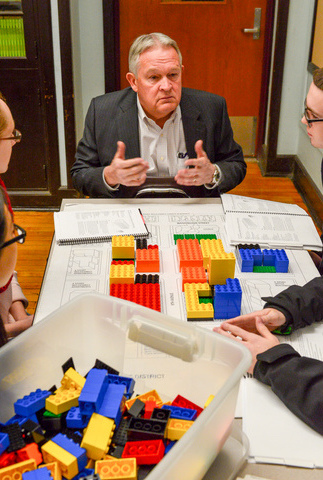UrbanPlan for Universities
UrbanPlan distills and transmits the essence of the development process more effectively, more comprehensively, in less time, with more lasting results than any other program suitable for a classroom environment.
David Green
Associate Principal, Perkins + Will, and former Professor of Urban Design, Georgia Tech
UrbanPlan prepares students for the reality and challenge of the multi-disciplinary teams, the client environments in which they will practice, and land use problems as they present in the “real world.” Practical, real, dynamic, frustrating – requiring them to see where practice collides with theory, ideology, or modeling. Through role assignments, which are different from their academic field of study, students are forced to understand risk, the approaches, pressures, and issues of the other disciplines on a development team.
This curriculum creates land use professionals–developers, planners, architects, investors, and policy makers–who are more sophisticated and effective when they enter the workforce. UrbanPlan is more effective with graduate students whose focus is land use: city and regional planning, MBA/real estate, and architecture. It can also be useful in carefully selected fourth-year undergraduate classes.
Additionally, UrbanPlan provides professional opportunities for students. They interact and develop relationships with leading real estate practitioners in their community who act as classroom “facilitators” and “city council members”.

How Does UrbanPlan Work in the University Classroom?
Student development teams respond to a “Request for Proposal” for the redevelopment of a blighted site in a hypothetical community. Each team member assumes one of five roles: finance director, marketing director, city liaison, neighborhood liaison, or site planner. Through these roles, students develop a visceral understanding of the various market and non-market forces and stakeholders in the development process. They must reconcile the often-competing agendas to create a well-designed, market responsive, and sustainable project.
Teams address challenging financial, market, social, political, and design issues; develop a proforma and three-dimensional model of their plan; and present their proposal to a “City Council” of ULI members.
At strategic times during the project, volunteer land use professionals interact with the student teams:
“Facilitators” – Through Socratic interaction, UrbanPlan volunteers challenge the students to think more critically about the UrbanPlan issues and the specific responsibilities of their “role”. (Financial Analyst, Marketing Director, Site Planner, City Liaison, Neighborhood Liaison)
“Presenters” – UrbanPlan volunteers engage in interactive discussion with students on their own project work or professional challenges and, how these relate to issues and decisions the students are struggling with in UrbanPlan.
“City Council” – UrbanPlan volunteers hear student presentations, engage, and challenge their proposals as in an actual city council hearing, and award the development contract to the winning team.
Bring UrbanPlan to Your Classroom
Contact ULI San Diego-Tijuana staff to learn more about how to bring the UrbanPlan program to your classroom.
